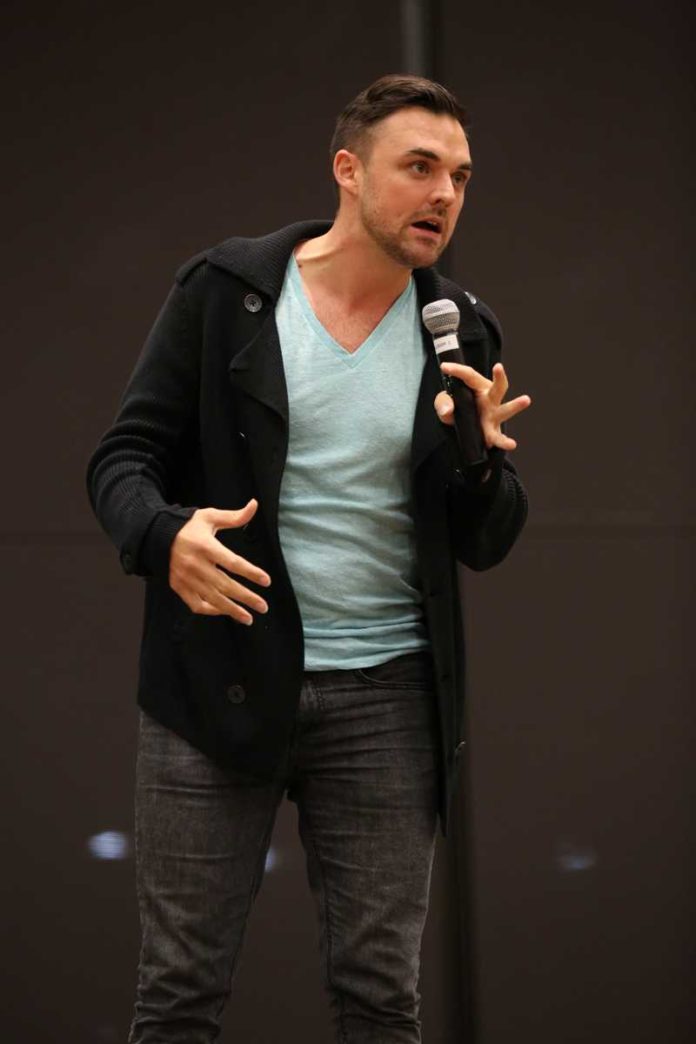“So, I’m not gay,” were the opening words of Sam Killerman’s comedy show, “It’s Pronounced Metrosexual,” about snap judgments, identity and oppression Tuesday evening.
The comedy show was part of Pride Week, which also included a drag show, candle light vigil, movie night and other awareness and celebratory activities.
As the author of “The Social Justice Advocate’s Handbook: A Guide to Gender,” Killerman began doing stand-up comedy of his own experiences being a straight man often stereotyped as homosexual due to his appearance, the topics he spoke about and other characteristics he possessed or were attributed to him.
“It’s Pronounced Metrosexual” is meant to give individuals “a better understanding of themselves and a concrete way to make change if that’s something they want to do,” Killerman said.
Presenting ideas about sexual identity, sexual orientation, gender and oppression in an accessible way is extremely important, Killerman said.
“I like to take the Mary Poppins approach,” he said. “A spoonful of sugar helps the medicine go down.”
His sweetener of choice happens to be laughter.
“What a wonderful way to talk about issues that are…complicated,” Jodi Solito, director of the women’s center, said.
People are often afraid of what they don’t know and are reluctant to ask for clarification, she said. Through her experience in Safe Zone Training, a program that creates a comfortable environment at school, work and other settings that are supportive to LGBTQ (lesbian, gay, bisexual, transgender and queer) individuals as well as straight persons who support equal rights and opportunities (allies), Solito learned about Sam Killerman and thought he would be a great role model to bring to students, she said.
Killerman warmed up the crowd with a timeline of his childhood memories up until the moment he asked his date to become his girlfriend, to which she replied, “but you’re gay,” Killerman recalled.
After several repeated occurrences, Killerman acknowledged the problem was not of sexual orientation, or who one is attracted to, but of gender roles, he said.
Killerman described himself as a very feminine straight man – one who plucks his eyebrows, dresses rather fashionably and takes pride in his hair, he told the audience.
“You’re not gay enough to be gay, but not straight enough to be straight,” he described his lack of a label.
“We think of labels as being bad, but they can be very empowering,” Killerman said.
Killerman felt that empowerment years ago when an audience member brought the term “metrosexual” to his attention, he said.
“Metrosexual,” coined by Mark Simpson, is defined as a man who is meticulous about his grooming and appearance.
While Killerman had found this new label, it is also such labels and how they are interpreted that causes people to make snap judgments, he said.
“We see someone and size them up immediately,” Killerman said.
In prehistoric times, people who were good at making quick judgments survived, he said. They saw a flower and thought of it as pretty or saw a tiger and thought “run,” he explained.
Today, making snap judgments can lead to a cycle of oppression when those judgments influence how you, your friends, family members and other groups in society view and treat others, he said.
Social oppression is when one group supports the mistreatment and/or exploitation of another group. If we as individuals cannot oppress someone, Killerman said, we as individuals cannot “not oppress” someone either.
There is one rule, The Golden Rule, that exists in some form in all religions and it says, “Do unto others as you would have them do unto you,” Killerman said. The problem with this is that it assumes everyone has the same wants and needs as you do.
“You tend to give the help you want yourself,” he said.
That is, if you are a person who needs to talk about your problems, you may encourage others to talk about theirs. But perhaps their needs and wants are different, Killerman argued.
Instead, he prefers The Platinum Rule – treat others as they would like to be treated, he said.
The best way to help someone is to ask them how they would like you to help, Killerman said.
“How can I be a good ___________ (friend, partner, student, etc.) to you,” he said.
And this rule applies not only in helping others but in making snap judgments, Killerman said.
“The only assumption you can make is that you don’t know and you should give them the opportunity to tell you who they are,” he said.








